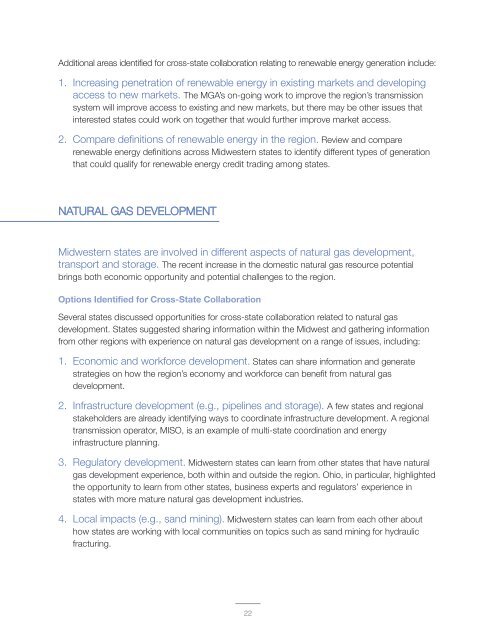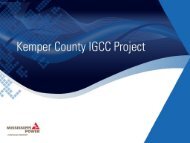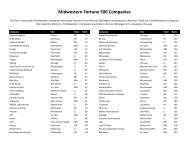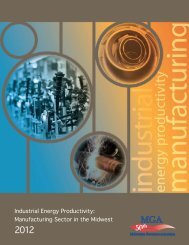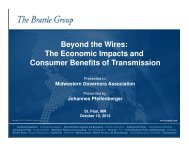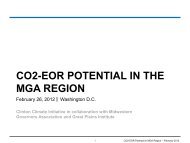Energy Action Paper - Midwestern Governors Association
Energy Action Paper - Midwestern Governors Association
Energy Action Paper - Midwestern Governors Association
You also want an ePaper? Increase the reach of your titles
YUMPU automatically turns print PDFs into web optimized ePapers that Google loves.
Additional areas identified for cross-state collaboration relating to renewable energy generation include:<br />
1. Increasing penetration of renewable energy in existing markets and developing<br />
access to new markets. The MGA’s on-going work to improve the region’s transmission<br />
system will improve access to existing and new markets, but there may be other issues that<br />
interested states could work on together that would further improve market access.<br />
2. Compare definitions of renewable energy in the region. Review and compare<br />
renewable energy definitions across <strong>Midwestern</strong> states to identify different types of generation<br />
that could qualify for renewable energy credit trading among states.<br />
NATURAL GAS DEVELOPMENT<br />
<strong>Midwestern</strong> states are involved in different aspects of natural gas development,<br />
transport and storage. The recent increase in the domestic natural gas resource potential<br />
brings both economic opportunity and potential challenges to the region.<br />
Options Identified for Cross-State Collaboration<br />
Several states discussed opportunities for cross-state collaboration related to natural gas<br />
development. States suggested sharing information within the Midwest and gathering information<br />
from other regions with experience on natural gas development on a range of issues, including:<br />
1. Economic and workforce development. States can share information and generate<br />
strategies on how the region’s economy and workforce can benefit from natural gas<br />
development.<br />
2. Infrastructure development (e.g., pipelines and storage). A few states and regional<br />
stakeholders are already identifying ways to coordinate infrastructure development. A regional<br />
transmission operator, MISO, is an example of multi-state coordination and energy<br />
infrastructure planning.<br />
3. Regulatory development. <strong>Midwestern</strong> states can learn from other states that have natural<br />
gas development experience, both within and outside the region. Ohio, in particular, highlighted<br />
the opportunity to learn from other states, business experts and regulators’ experience in<br />
states with more mature natural gas development industries.<br />
4. Local impacts (e.g., sand mining). <strong>Midwestern</strong> states can learn from each other about<br />
how states are working with local communities on topics such as sand mining for hydraulic<br />
fracturing.<br />
22


